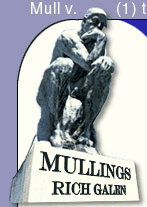|
|

|


What's Going to Happen?
Rich Galen
Wednesday April 27, 2011
Click here for an Easy Print Version
Republicans, including occasionally lapsed Republicans like me, have been whipping President Obama's latest approval-disapproval numbers around to each other leading to knowing nods about how difficult Obama's re-election is likely to be.
To that end, I thought it might be useful to look at the polling for Obama's predecessors at about the same time in their first terms.
According to Gallup, President Obama's approval is at 43 percent which is only two percentage points above his all-time low - which occurred last week. His disapproval is at 48 percent meaning about nine percent of respondents can't make up their minds, don't recognize the name "Barack Obama," or both.
So, 27 months into their terms how do the previous Presidents stack up?
Let's go to the chart. Going backward, here is how they scored in the Gallup poll on or about their 826th day in office:
George W. Bush - 69%
Bill Clinton - 51%
George H.W. Bush - 76%
Ronald Reagan - 43%
Jimmy Carter - 37%
Richard Nixon - 50%
John F. Kennedy - 64%
Dwight Eisenhower - 68%
SIDEBAR
Harry S Truman, Lyndon Johnson, and Gerald Ford each assumed the Presidency in mid-term so their 820th days in office don't match up with those who started on January 20th following the November election. Hence, they are not in the listing above.
END SIDEBAR
Of the nine Presidents on the list, their average approval rating was 52 percent at this point in their first terms.
George W. squeaked by in his re-election while he was at 69 percent approval 19 months out, while Bill Clinton cruised to a win against Bob Dole even though he was barely above water.
Jimmy Carter lost his re-election bid having been at 37 percent at this point in his Presidency, while H.W. Bush lost to Clinton even though he was at 76 percent approval in April of the previous year.
But, of the others, it doesn't look like what their approval ratings were in April of the off-year meant very much in November of the on-year.
The best example is Ronald Reagan whose 43 percent matches Obama's current rating. Reagan, let us remember, went on to win 49 states in his re-election in 1984 against the Democrats' dream team of Walter Mondale and Geraldine Ferraro.
On the other hand, Dr. John Pitney, professor in the school of government at Claremont McKenna College in California, sent me a great annotated bibliography of press pieces about how weak, how late-starting, how little-known, how futile it looked for Democratic candidates at about this point in the 1992 President cycle.
At about this point in the 1992 cycle, National Journal wrote:
"[T]he absence so far of strong challengers to Bush has fueled various doomsday scenarios for the Democrats: that their Senate majority could be toppled and that their House majority could be imperiled with many Democratic Members either retiring or having to run for reelection in new seats drawn after the 1990-91 redistricting."
As late as August of 1991, USA Today wrote:
"What once was shrugged off by Democrats as a passing gust of the political winds - the absence of heavyweight challengers to President Bush - is now looming as a major political embarrassment."
You might remember that on January 20, 1993 it was Bill Clinton who stood at the West Front of the Capitol and took the oath of office for his first term, not George H.W. Bush for his second.
It is true that Clinton was aided and abetted by Ross Perot who mounted a furious third-party candidacy and who, in spite of not winning any electoral votes, got nearly 20 percent of the popular vote.
While H.W. would probably not have won anyway, Perot's candidacy clearly cost Bush several states, much as - eight years later - third party candidate Ralph Nader likely cost Al Gore a victory in Florida and we know how that turned out.
So, when you hear the office know-it-all state with absolute certainty that they can divine the outcome of the Presidential election in November 2012 because of the polling in April of 2011; smile, nod, stir your coffee, and walk back to your desk.
He (or she) has no idea what's going to happen.
On the Secret Decoder Ring today: Links to the Gallup page, the Perot effect, and the excellent summary of news stories by Dr. John Pitney. Also a terrific Mullfoto and a Catchy Caption of the Day.
--END --
Copyright © 2011 Barrington Worldwide, LLC
Become a
Paid Mullings Subscriber!
(To join the FREE mailing list or to unsubscribe Click Here)

Current Issue |
Secret Decoder
Ring | Past
Issues | Email
Rich | Rich
Who?
Copyright �2007 Barrington Worldwide, LLC | Site design by Campaign
Solutions. | |
|


